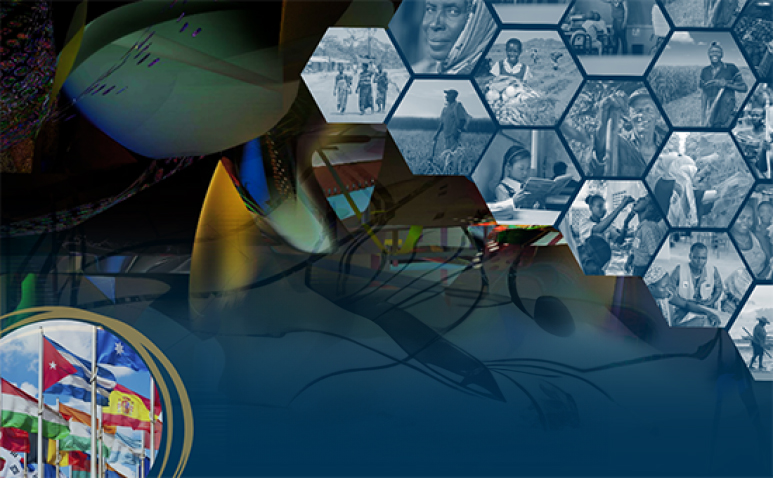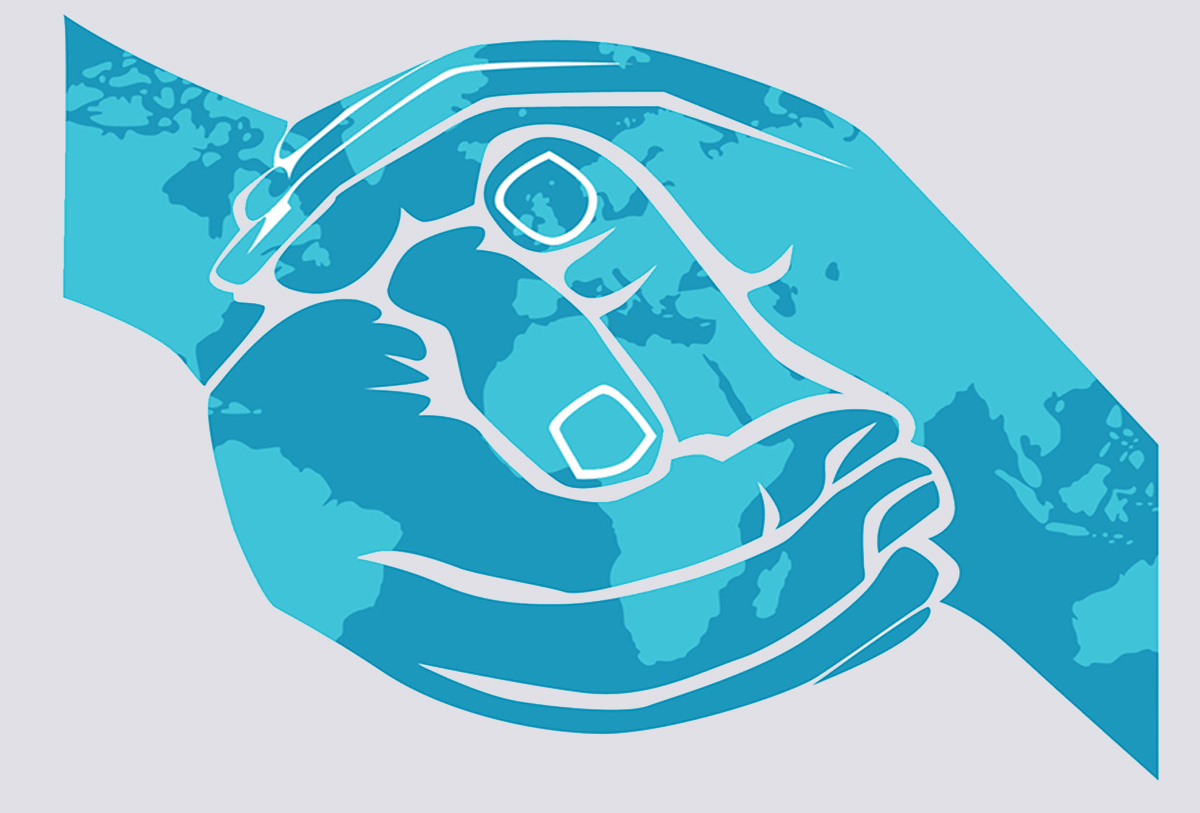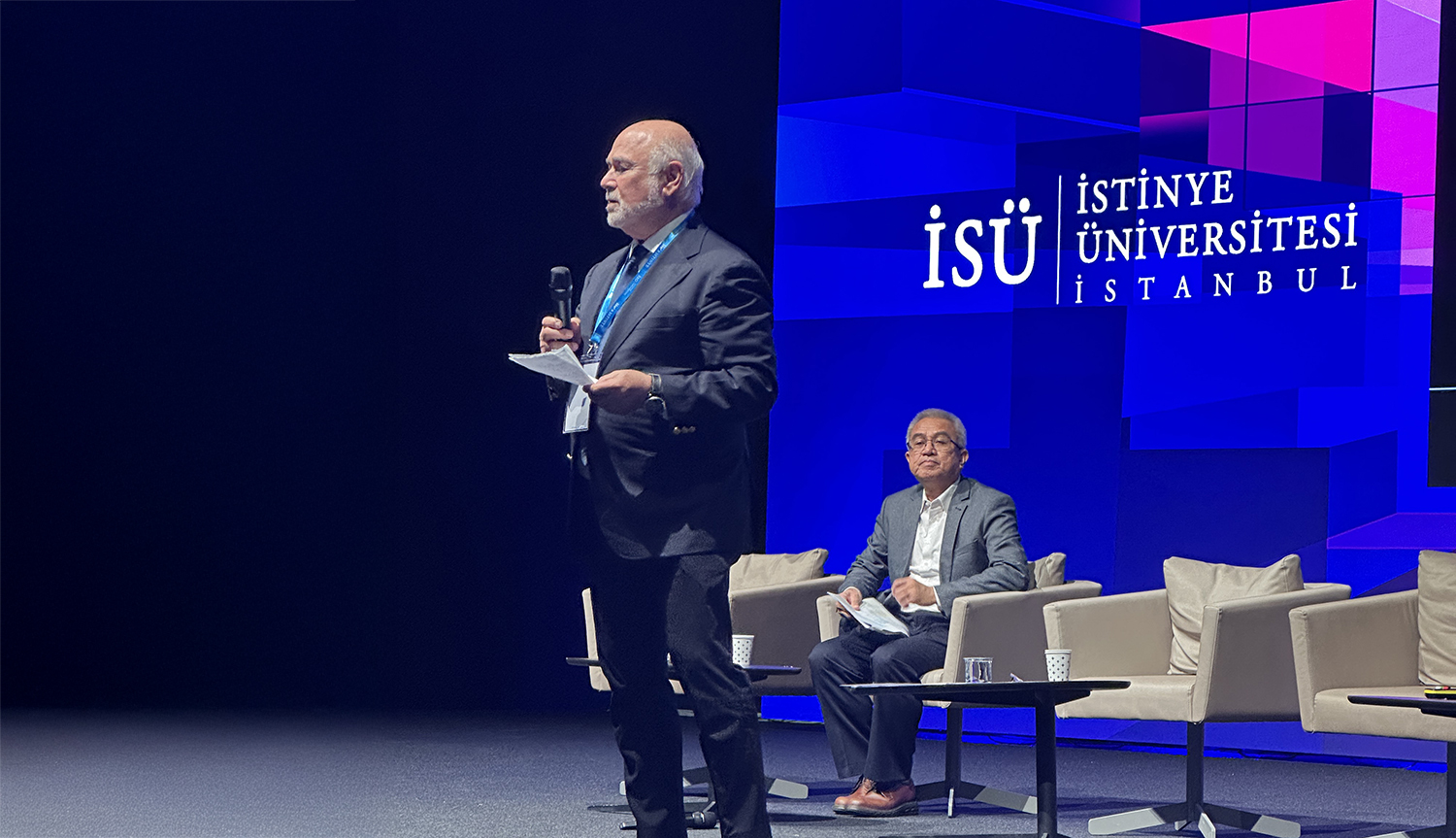On June 19, 2024, Jonathan Granoff, President of the Global Security Institute addressed the opening of an exhibition at the United Nations themed around human security.
The exhibition was organized by the United Nations Trust Fund for Human Security (UNTFHS) and co-sponsored by the Permanent Missions of Costa Rica, Italy, Japan, Romania, Senegal, and Slovenia, and in partnership with the Group of Friends of Human Security.
The exhibit transformed the visitor’s lobby to raise awareness on the complex challenges we face and the pivotal importance of human security and its application in promoting solidarity and collaboration across and within countries to better serve people, planet, peace, prosperity, and partnerships.
Through technology-driven immersive experiences, “MULTIPLICITY” highlights real-world examples of ongoing efforts from the local to the national, regional, and global level to advance Sustainable Development Goals, promote peace and stability, and address current and emerging challenges through the human security lens.

Speech delivered by Jonathan Granoff:
Your Excellencies, Under-Secretary-General Flemming, Friends,
It is my honor to share a few thoughts with you at this evening’s private reception and tour of the exhibit “MULTIPLICITY: Threats, Partnerships, and Stories of Success” organized by the United Nations Trust Fund for Human Security (UNTFHS) and co-sponsored by the Permanent Missions of Costa Rica, Italy, Japan, Romania, Senegal, and Slovenia, and in partnership with the Group of Friends of Human Security.
Thank you Mehrnaz Mostavi and the entire team of the UN Trust Fund for Human Security for your service to the UN and humanity and for bringing us together this evening.
Thank you so very much Under-Secretary-General Fleming for your substantive presentation and generous introduction. Full disclosure. We have had the pleasure of working together at Summits of Nobel Peace Laureates, where she represented the Laureate organization the UN High Commission for Refugees. These summits, which began over two decades ago, has an organization which I am honored to serve as its Representative to the UN.
At each Summit a formal statement has been produced and that often emphasizes consistent themes:
1. Sustainable and inclusive development, security and human rights are interdependent.
2. There is no option for failure to strengthen cooperative multilateralism to address global challenges such as oceanic health, nuclear weapons, climate protection, inequity, and poverty, denuding forests, peace, and pandemics.
3. And, to quote from the most recent Summit in South Korea, “There can be no national security without shared Human Security.”
My personal realization of the importance of human security goes back to the foundation of its articulation in the UNDP Development Report of 1994 led by Mahbub ul Haq and Inge Kaul which focused on seven dimensions of security: i) economic; ii) food; iii) health; iv) environmental v) personal; vi) community; and vii) political . Today we must include technological security, which would include the new digital environment, not yet formed just a few decades ago.
Dr. ul Haq described the “why” eloquently:
In the final analysis, human security is a child who did not die, a disease that did not spread, a job that was not cut, an ethnic tension that did not explode in violence, a dissident who was not silenced. Human security is not a concern with weapons—it is a concern with human life and dignity.
In 2022, in a thorough report, UNDP highlighted present threats to human security that require invigorated multilateralism.
We can find further roots of the tool of Human Security in the world summits of the 1990’s. Because I joined with literally tens of thousands of informed and concerned members of civil society and participated in several of them I felt confident in 2000 to write in a law review article – Nuclear Weapons, Ethics, Morals and Law — that these summits articulated “the integrated human security agenda.”
Note the present relevance of the themes of these Summits:
- New York, 1990, Children;
- Rio, de Janiero, Environment (Earth Summit);
- Vienna, 1993, Human Rights;
- Cairo, 1994, Population and Development;
- Copenhagen, 1994, Social Development (Poverty);
- Berlin, 1995, Climate;
- Beijing, 1995, Woman;
- Istanbul, 1996, Habitat II (Cities)
From these events the Millennium Development Goals emerged, which of course have evolved into the Sustainable Development Goals and the Agenda for the Future. This process has benefited enormously from civil society engagement and that is why our host the UN Trust Fund for Human Security so wisely partnered with the World Academy of Art and Science (WAAS), founded by luminaries such as Albert Einstein, Bertrand Russell, Robert Oppenheimer and Joseph Rotblat, to promote the Human Security 4 All Campaign.
I serve as Fellow and Trustee of the Academy and worked on this project directly. One aspect of its impact was the Academy’s partnering with the world’s most influential tech event of 2023 and 2024, the CES conference of the Consumer Technology Association held in Las Vegas with over 115,000 participants from 174 countries with 60% of the Fortune 500 companies represented. Its central theme, robustly advanced with flare and substance, was Human Security for All.
I share these examples because we are all well aware of the UN’s work but its impact and outreach is often not sufficiently appreciated. With the help of the UN Human Security Trust such dynamic outreach and advocacy will continue to expand.
Today’s exhibit is the pinnacle of a year that has seen pivotal developments in human security discussions, including the issuance of Secretary-General António Guterres’ report on human security (A/78/665) and an informal meeting of the General Assembly plenary to discuss the report in April. Of particular and pressing relevance, he said then:
Human security has proven its value as a framework to focus on supporting people to live in dignity, free from want and fear.
It can help accelerate progress towards Agenda 2030, prevent the emergence of future crisis, and deliver the hope people need.
I urge all countries to use the important tool of human security to address today’s multilayered crisis – and to integrate its insights into our efforts to prepare for future challenges.
Expressly integrating human security into the potentially transformative upcoming summits and events can help advance fulfillment of the Sustainable Development Goals (SDGs), advance our Common Agenda, and meet the ambitions for the Summit of the Future.
We face profound challenges on multiple fronts. And we face them at a time when trust in institutions of governance requires improvement.
Fulfilling the Agenda for the Future, needs wider public support. Human security is a framework that normal citizens can understand and appreciate.
The Summit of the Future in September can benefit enormously by emphasizing the essential framework of human security. It puts a face on words of policy with which we work here at the UN.
By focusing on the realities of life seen through the eyes of people, human security puts a face on the words of policy with which we work here at the UN.
People from Wall Street to Main Street as well as the far too many on “no street” live under the threat arising from several challenges unique to this moment of history – for example, protection of bio diversity, oceanic health, nuclear catastrophe, and climate change.
These causes of insecurity cannot be adequately addressed at only national levels and responding appropriately requires common purposes and coordinated efforts. The UN is essential for this process. Here we can say “we” and mean everyone.
Human security is a conceptual framework that integrates daily life considerations of all people with global governance concerns. It is a unifying lens that draws its purpose from what is needed to ensure the survival, livelihood and dignity of people at every level.
Human security helps bring clarity of focus on meeting the needs of “We the peoples of the United Nations”. That focus will amplify our work to overcome the differences and divisions that confront us.
Our world needs this focus on human security to help governments and the multilateral system tackle the enormous challenges ahead of us from adapting to climate change, governing the digital economy, to ending and recovering from existing violent conflicts.
Never before has there been such a convergence of a morally compelling need to serve to protect our fragile planet and its precious inhabitants and fulfill already agreed practical policy commitments. Human security is a tool to ensure our success.
The Global Security Institute is dedicated to strengthening international peace and security based on co-operation, diplomacy, shared interests, the rule of law and universal values. Our efforts are guided by the skills and commitment of our team of former heads of state, distinguished diplomats and politicians, celebrities, religious leaders, Nobel Peace Laureates, disarmament and legal experts, and concerned informed citizens. Our focus is on controlling and eliminating humanity’s greatest threat – nuclear weapons.







